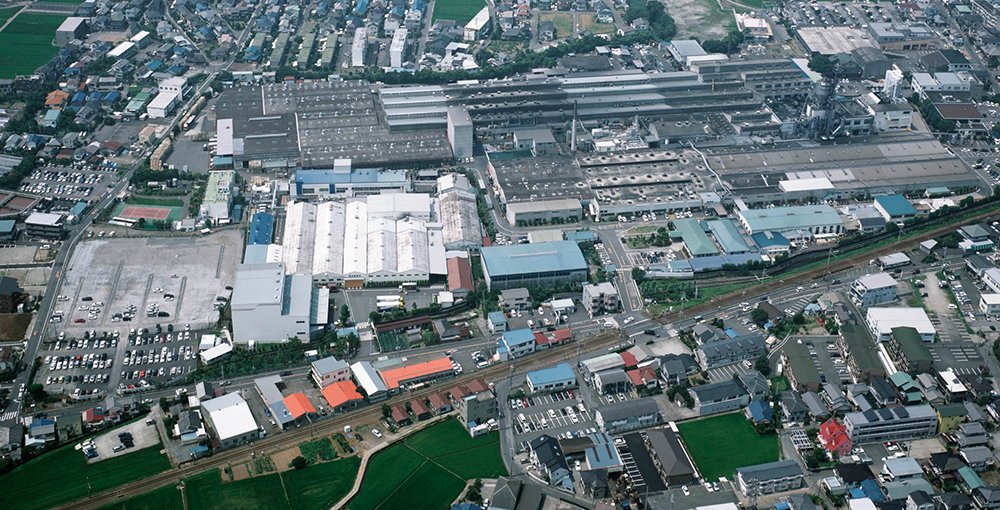
Hiratsuka, Japan—The Yokohama Rubber Co., Ltd., announced today that the motorsports tire production line at its Mishima Plant has shifted its use of electric power completely to renewable energy-generated electric power (hereafter, renewable-energy electricity) from this January. Tires produced on this line will contribute to carbon neutrality in motorsports events held in Japan and around the world in 2023.
The renewable-energy electricity used by the motorsports tire production line is considered to be derived 100% from renewable energy sources and deemed to generate zero CO2 emissions as electric power provider TEPCO Energy Partner, Inc. has procured FIT non-fossil fuel certificates with tracking information*1 and non-FIT non-fossil fuel certificates with renewable energy attributes*2 for the electricity being provided to the line.
The Mishima Plant produces motorsports tires supplied by Yokohama Rubber for use in top category races around the world, such as Japanese SUPER FORMULA Championship and the SUPER GT races in Japan, the Nürburgring 24-Hour Race in Germany, and the Pikes Peak International Hill Climb in the United States.
The shift to renewable-energy electricity on the Mishima Plant’s motorsports tire production line is Yokohama Rubber’s latest initiative targeted at achieving carbon neutrality and developing a sustainable motorsports industry. In line with its goal of achieving net zero CO2 emissions by 2050, Yokohama Rubber is promoting carbon neutrality at its production sites, self-generation and procurement of renewable energy, energy-saving activities, and nature positivity through its tree-planting and biodiversity conservation activities. In addition to achieving carbon neutrality, Yokohama Rubber’s environmental initiatives to realize a circular economy are aiming for 100% use of sustainable materials by 2050.
Yokohama Rubber also is accelerating its motorsports activities aimed at achieving carbon neutrality and a circular economy. One recent success in this area is the supply of YOKOHAMA tires for use in this season’s Japanese SUPER FORMULA Championship races. The supplied tires used in dry conditions have achieved a 33% sustainable materials ratio*3 while maintaining the excellent grip performance of the conventional tires used in SUPER FORMULA races. These tires are being produced on the Mishima Plant now powered by renewable-energy electricity. Yokohama Rubber is supplying tires for use in dry conditions from the series opening race in April and plans to begin supply tires for wet conditions from July. Meanwhile, the company will continue its effort to raise the sustainability material ratio of its motorsports tires.
Yokohama Transformation 2023 (YX2023), Yokohama Rubber’s medium-term management plan for fiscal years 2021–2023, includes sustainability initiatives that are based on the concept of “Caring for the Future.” Yokohama Rubber believes that conducting business activities aligned with its sustainability initiatives will help resolve social issues and lead to the continued increase of its corporate value.
*1: FIT non-fossil fuel certificates are certificates of the environmental value of energy generated from non-fossil renewable energy sources that are subject to the FIT (Feed-In Tariff) system, including solar, wind, small hydropower, and biomass. FIT non-fossil fuel certificates with tracking information include a tracking function that provides such information as the specific power source and the type of power source linked to the production site. FIT non-fossil fuel certificates with tracking information can be used by companies to report their progress in advancing the use of renewable energy to such international organizations as RE100, a global corporate renewable energy initiative bringing together companies committed to using 100% renewable-energy electricity in all their business activities; CDP, a non-profit organization that aims to realize a sustainable economy; and the Task Force on Climate-related Financial Disclosures (TCFD).
*2: Non-FIT non-fossil fuel certificates with renewable energy attributes are awarded to renewable energy sources that are not subject to FIT, such as large hydropower plants.
*3: The 33% sustainable materials ratio has been achieved by using natural rubber, various naturally derived compounding agents, such as oil from oil palm fruit nuts and orange peels, recycled iron, rubber recycled from waste tires, and synthetic rubber made using the mass-balance method.
Yokohama Rubber Mishima Plant’s motorsports tire production line shifts to renewable energy–generated electric power


